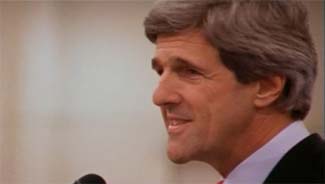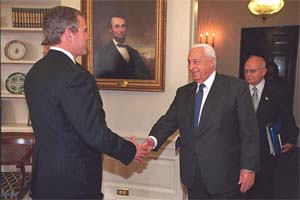
|
|
|
|
How Do John Kerry's Foreign Policies Differ from Bush's? |
|
Leave it to the San Francisco Chronicle's brilliant cartoonist/satirist, Don Asmussen, the creator of "Bad Reporter: The LIES behind the TRUTH, and the TRUTH behind those LIES that are behind that TRUTH," to sum up Kerry's dilemma: The strip's first panel on April 23 strip features the headline "U.S. Invaded, Taken Over By Al Qaeda - Kerry Still Lags Behind Bush." While Kerry's "brain trust" urges him to strike back, the candidate incredulously claims that the "voters are more interested in education." In the penultimate panel, Bush has "accidentally" destroyed the Earth, yet, "Kerry Still Trails in Polls." Finally, Bush, in space standing on "on a piece of what used to be Maine," is calling for "More Tax Cuts." A "directionless" Kerry is floating around in space and grasps for the "one last chance to turn things around." He reaches out forůSen. Joe Lieberman! (For the complete strip see http://www.sfgate.com/cgi-bin/article.cgi?file=/chronicle/archive/2004/04/23/MNASMUSSENBR.DTL . On the domestic side of the balance sheet, should Kerry be elected he won't be calling on the Reverend Jerry Falwell and the Reverend Pat Robertson for advice; he won't have a horde of right wing operatives embedded within the administration fashioning domestic policy; and his administration won't be a one-stop employment agency for policy wonks from the Heritage Foundation, the American Enterprise Institute, the Family Research Council and other right wing think tanks, public policy institutes and lobbying outfits. On such issues as a woman's right to choose, workers rights, judicial appointments, faith-based initiatives, education, health care and the rights of gays, Kerry has thus far remained on the moderately liberal to progressive side of the ledger. However, in light of the dramatic increase in U.S. casualties in Iraq - more than 740 as of this writing - the continued siege of Fallujah - a city that has already experienced more than 1000 dead, including hundreds of woman and children - and the daily suicide bombings and insurgent attacks, it is becoming increasingly clear that the battlefield for the election will not be the economy, education, the environment or even same-sex marriage. It will be the president's war on terrorism, his failed occupation of Iraq, and Bush's other "visionary" foreign policy initiatives. On these issues it is incongruous and shameful that Kerry has chosen to march nearly lock-step with Bush. There are nuanced differences between Kerry and Bush on Iraq, as he tried to point out in his address at Westminster College in Missouri last week. While supporting the war, Kerry doesn't think Bush is handling the postwar period well. Kerry suggests U.S. resources are being squandered in the war against terrorism, But in the main, these are differences without a distinction. Kerry prefers the United Nations take a leading role in the "handover," but that pretty much squares itself with Bush's recent statements that the construction of a transition government is in the hands of the United Nations special envoy Lakhdar Brahimi. Bush's move "essentially co-opted Kerry's long-standing proposal that the United Nations be given a key role in administering the occupation and organizing elections," the San Francisco Chronicle's Robert Collier recently wrote.
Kerry appears to be out-Bushing Bush when it comes to Cuba and Venezuela: Seeing Florida in play, he has emphasized his support for the four- decade-old Cuban embargo; and he has accused Venezuela President Hugo Chavez of "allowing Venezuela to become a haven for narco-terrorists" and fomenting revolution in the hemisphere by supporting Columbia's leftist guerrillas. Instead of confronting Bush head on these critical foreign policy issues, Kerry's election strategy has Democratic Leadership Council (DLC) stamped all over it, causing many to question whether the Democratic candidate is nothing more than "Bush-Lite." Wikipedia ( http://en.wikipedia.org/wiki/Main_Page ) , the free online encyclopedia sponsored by the Florida-based not-for-profit corporation, the Wikimedia Foundation Inc., defines the DLC http://www.ndol.org/ndol_ka.cfm?kaid=86 as an organization of "moderate" Democratic Party leaders "which works toward moving the Party toward moderate centrist positions." The DLC believes "that leftist positions are not viable, citing the failed candidacies of George McGovern and Walter Mondale," and touting the success of Bill Clinton, who "is sometimes cited as evidence of the success of their policies." Ralph Nader has branded the organization "corporatist" and "soulless." In a July 29, 2003 piece titled "The Democratic Weaselship Council" Salon's Joan Walsh asks rather incredulously "Has Karl Rove taken over the Democratic Leadership Council?" In June 2003, barely three months after the invasion of Iraq and six months before the Democratic presidential primaries, Al From, the DLC's founder and CEO, and Bruce Reed, President Clinton's former domestic policy adviser and the organization's president, laid out their strategy for winning back the White House in the DLC's Blueprint Magazine. The message: The Democratic candidate should follow the strategy of former president Bill Clinton and "seize the vital center," and "notůveer left." From and Reed make no mention of Bush's foreign policy initiatives. Nine months later, in the March 2004 issue of the magazine, From and Reed are back with "The Road to Victory" - "five rules for the Democratic candidate to follow in the coming battle for the presidency." After thanking Kerry for saving the Democratic Party - from the Deaniacs no doubt - the two offer the following, mostly reasonable, advice: 1. "choose the politics of hope and opportunity instead" of the old "politics of anger"; 2. capture the swing voters, "because you can't win without them"; 3. "offer a new contract with the forgotten middle class"; 4. emphasize reform and respond to Republican attacks; and 5. don't "conform to the old party orthodoxy" and show you're a "different kind of Democrat." In more than 3000 words, as well as two accompanying articles, From and Reed again make no mention of what in the intervening months have become Bush's foreign policy disasters. However, in a policy document entitled Progressive Internationalism: A Democratic National Security Strategy the DLC addresses foreign policy issues. It basically echoes the Bush Administration's foreign policy objectives, while giving lip service to the need for including other nations. The document touts the "party's tradition of muscular internationalism" and explains that it "supported the Bush administration's toppling of the Taliban regime in Afghanistan" and "backed the goal of ousting Saddam Hussein's malignant regimeůbecause Saddam posed a grave danger to America as well as his own brutalized people, and because his blatant defiance of more than a decade's worth of United Nations Security Council resolutions was undermining both collective security and international law." News that Bob Shrum, the long-time Democratic Party insider and close advisor to Senator Ted Kennedy - who recently called Iraq "George Bush's Vietnam" - will be playing a greater role in the Kerry campaign may or may not shift the candidate's foreign policy thrust. Shrum is a co-founder, along with James Carville and Stanley Greenberg of Democracy Corps, a liberal political research group that frequently counters the DLC line. Eliot Cohen, director of the Strategic Studies Program at Johns Hopkins University's School of Advanced International Studies, isn't sure there will be any policy changes. "When I look at the kinds of people who are advising Kerry, assuming Kerry runs his foreign policy from center and right of the Democratic Party, it would be very compatible with the Bush administration," Cohen told the Chronicle's Robert Collier |
 How would Sen. John Kerry do things differently in the area of foreign affairs?
How would Sen. John Kerry do things differently in the area of foreign affairs?  George W. Bush meets with Israeli Prime Minister Ariel Sharon. Both Bush and Kerry have backed Sharon's policy of assassinating Hamas leaders
George W. Bush meets with Israeli Prime Minister Ariel Sharon. Both Bush and Kerry have backed Sharon's policy of assassinating Hamas leaders